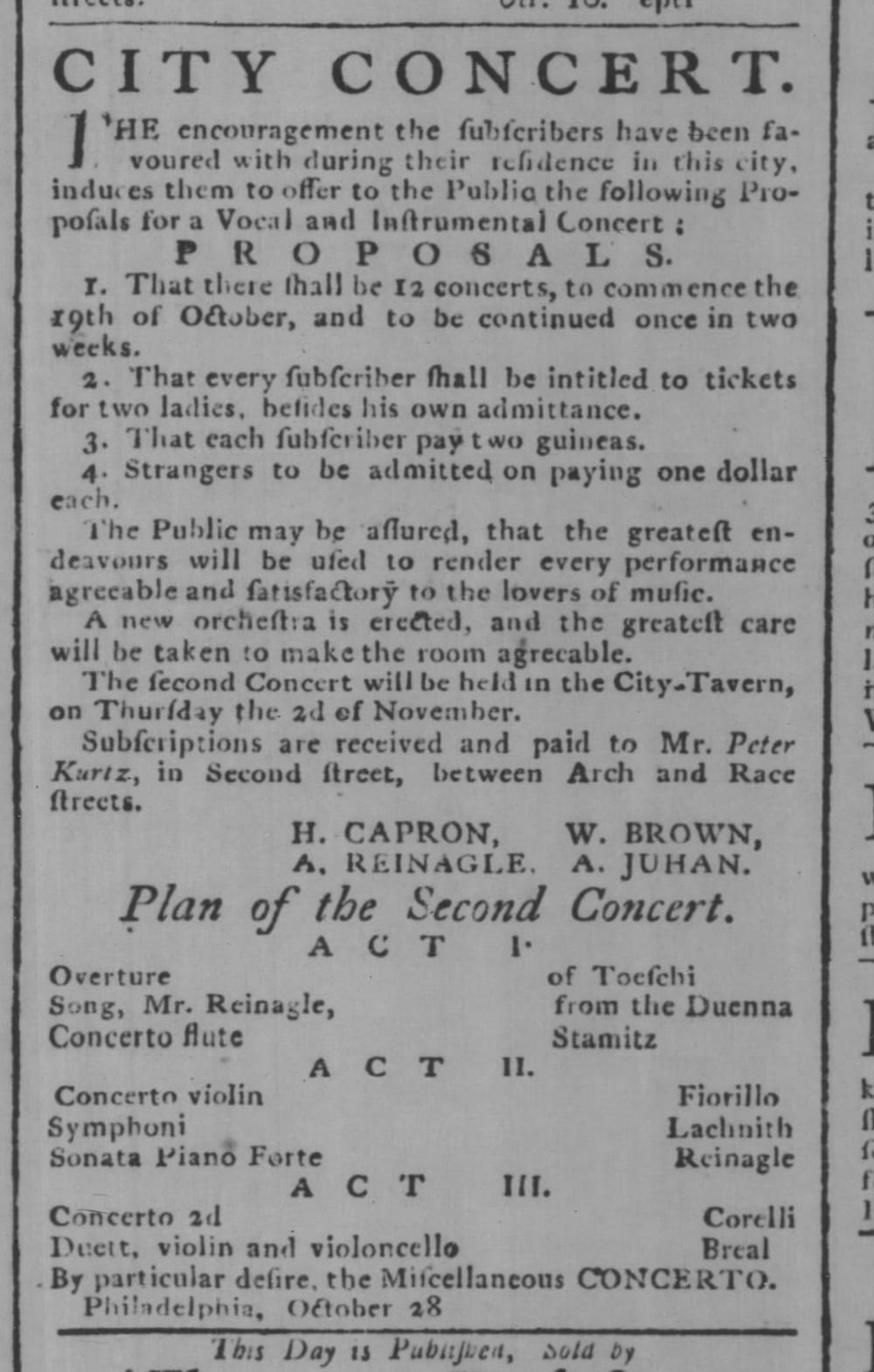Stay in the Loop
BSR publishes on a weekly schedule, with an email newsletter every Wednesday and Thursday morning. There’s no paywall, and subscribing is always free.
The tunes of the Revolution
Main Line Early Music presents The Publick Pleasure: Music of 18th-Century Philadelphia

Philly is a great music town with a wealth of musicians and ensembles—contemporary, pop, jazz, classical—large and small and everything in between. So it should be no surprise to learn that in the 18th century, at the birth of our nation, the city already had a vibrant concert scene.
Music and Philadelphia history met joyfully in The Publick Pleasure, the most recent offering in the excellent series presented by Main Line Early Music. The afternoon’s repertoire was drawn from the surprisingly informative, detailed concert advertisements of the Federal era uncovered by Philadelphia cellist Eve Miller.
Miller began researching as a fill-in pandemic project. Looking through digitized newspapers and other archives (including at the Library of Congress and Penn), she learned of frequent concerts in 18th-century Philadelphia, often at City Tavern (2nd and Walnut) and Oeller’s Hotel (6th and Chestnut, across from Independence Hall). Thomas Jefferson held a subscription, and George Washington and Benjamin Franklin attended these concerts, promoted as making “all arrangements for the publick pleasure.” Miller thus discovered both the title and theme of an enchanting musical afternoon.
Elan, ease, and grace
Gathering an ensemble of six fine early-music players, Miller programmed works by six composers who illustrated the music of those times. Though they were enormously popular in the late 18th century, with one exception, they are not well-known today. That exception is Johann Christian Bach (1735-1782), the 18th and youngest child of Johann Sebastian Bach, known as “The London Bach” because he worked there extensively.
One of the afternoon’s two solo harpsichord works featured John Walthausen in Bach’s three-movement Sonata No. 2 (Op. 5) in D Major. The program’s other solo keyboard work was “The Third Number” (Rondo, allegretto) by JC Moller (1755-1803). Written in 1793, that showy single-movement composition (like the three-movement Bach) is filled with musical shifts, rubato, and trills, and Walthausen handled both works with a deft elan.
The concert opened with the dance-influenced Sonata No. 4 in G minor for Flute and Continuo by Giuseppe Sarti (1729-1802), a work clearly designed for salons and matched in elegance by the trio that played it. Buoyed by continuo from Walthausen and Miller, flutist Steven Zohn played with virtuosic ease, beautiful tone, and sustained grace.
The afternoon also featured a 1784 Sonata (No. 2, Op. 5) by Jean Balthasar Tricklir (1750-1813), a composer extremely well-known in his day but virtually unknown in ours. His sonata is filled with challenging runs for the cello that aptly echo his name. And there were four recognizably Scottish Airs from a collection by violinist James Oswald (1710-1769). That set included “Northern Lass,” “Maud’s Complaint,” and “Apron Dearie,” instrumental versions (featuring Zohn’s lyrical, often melancholic flute) of songs that Philadelphians would likely have known.
The Pleyel craze
The concert closed with a remarkable String Quartet in D Major (B342) by Ignace Pleyel (1757-1831). Miller noted that work by the prolific Pleyel (42 symphonies and 72 string quartets) is rarely played now, but it was featured on 1790s Philadelphia programs more than any other composer. He was a student of Haydn and had been a London concert impresario, and his music was cited by contemporary sources as “a craze.”
For that three-movement work, Miller was joined by three other well-known early-music string players: violinists Margaret Humphrey and Edmond Chan, and violist Amy Leonard. It’s surprising that this piece is not played; it’s a virtuosic work with surprising melodic treatments, musical twists, and consistent humor. You can feel Pleyel’s strong sense of himself and command of his writing and ability to toy with audience expectations in assured and interesting ways, including an unexpectedly gentle, quietly breathtaking ending.
The Founding Fathers’ night out
The 18th-century “City Concerts” were organized and played by professional Philadelphia virtuosos who trained in Europe. Among them were Alexander Reinagle, a keyboardist and multi-instrumentalist who emigrated from England and became a Philadelphia theater impresario; cellist, guitarist, and singer Henri Capron, who emigrated from France via what is now Haiti; and the German-born Moller, an organist, keyboardist, and music publisher who taught Thomas Jefferson’s daughter, confirmed by Jefferson’s accounting entries of lesson payments.
Miller’s work made it clear how important “contemporary” music was to the founding fathers. In October 1786, a 12-concert series was advertised in The Pennsylvania Packet. Benjamin Franklin wrote in a letter that when “Oswald plays a plain old Scottish tune on his violincello, [it brings] Tears of Pleasure in the Eyes of his Auditors.” And George Washington’s diary noted that after a particularly long session of the Continental Congress (on May 29, 1789), he attended “Mr. Juhan’s Concert” at the City Tavern.
Miller marveled that “walking around Old City, I now can feel it populated by gigging musicians just like us.” Hopefully, discoveries like these about Philadelphia’s musical past will continue to be made by those creating its musical present.
What, When, Where
The Publick Pleasure: Music of 18th-Century Philadelphia. Steven Zohn, flute; Margaret Humphrey, violin; Edmond Chan, violin; Amy Leonard, viola; John Walthausen, harpsichord; and Eve Miller, cello. Main Line Early Music. January 15, 2023, at the Church of the Good Shepherd, 1116 E. Lancaster Avenue, Rosemont, PA. goodshepherdrosemont.com/mainline-earlymusic.
Accessibility
Masks were not required, though some musicians and audience members were masked.
The church is wheelchair accessible, though restrooms are located down a corridor with steps.
Sign up for our newsletter
All of the week's new articles, all in one place. Sign up for the free weekly BSR newsletters, and don't miss a conversation.

 Gail Obenreder
Gail Obenreder